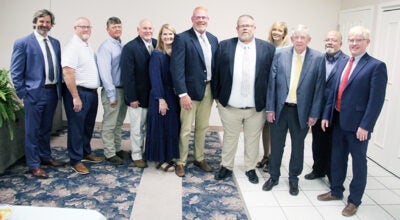1 year later, Phillips still free
Published 11:59 pm Friday, June 12, 2009
A year after being indicted by a grand jury on felony ethics and theft charges, and seven months after being found guilty and receiving a 10-year split sentence, former Covington County Probate Judge Sherrie Phillips remains free on an appeals bond, waiting for the Alabama Court of Criminal Appeals to rule on her case.
In June of last year, Phillips, who was a four-term probate judge, was indicted on six felony theft and ethics charges.
The case involved the estate of a deceased man, Cary Douglas Piper of Castleberry in Conecuh County, who appeared at the time of his death to have no heirs and no will. Six first cousins were later identified.
State law sets out a probate process called escheat, in which the assets of a person who dies without heirs or a will are turned over to the state, where they are held for 20 years in case heirs appear.
Phillips used a $1.8 million check from the estate to open a personal money market account, using her home address and her Social Security number. She then spent more than $516,000 of the funds, with which she paid off personal debt, purchased two vehicles, paid for repairs to her home and loaned money to two relatives.
In October, a Covington County jury found Phillips guilty of two of the original six counts, including theft by deception of $1.8 million and intentionally using her official position for unlawful personal gain for herself or a family member.
In September, Phillips retired from office, although she had been removed from the bench pending the outcome of her trial. After being found guilty, she lost her license to practice law.
Phillips, who is being represented in her appeal by David Harrison of Geneva, raised five claims of alleged reversible error by the trial court in denying her motion of judgment of acquittal, based on her assertion that the state’s evidence failed to establish a prima facie case of the offense charged.
In the appeal, she argued that the state failed to prove whom the owner of the Piper estate was and therefore failed to prove she was not in rightful possession.
In a brief filed by the office of Attorney General Troy King, the state argues that, “While Phillips might have had a claim as a fiduciary in her official capacity as the probate judge, her actions as proved by the state were personal actions beyond the scope of her authority.”
The state also argues that “(Phillips) did not document the $1.8 million through the normal procedure of the probate court where it would have been placed in a fiduciary account.”
Phillips also contends the state failed to prove theft by deception because it failed to prove any false or deceptive statements made by her. She also claims the state failed to prove she had the intent to deprive the owner of the property, and the state failed to prove the elements of unlawful use of official position for personal gain. She also argues that, because the money was repaid after the state began investigating, there was no personal gain.
But attorneys for the state wrote in its brief, “Not having a mortgage payment, car payment, or to pay for your own home improvements certainly is personal gain.”
A clerk in the Court of Criminal Appeals said Friday the case has gone to court. Attorneys familiar with the workings of that court said it could take up to 18 months for the court to rule.





